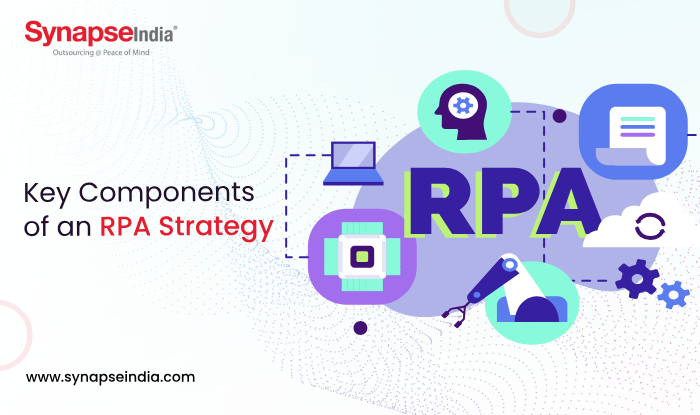 22 Apr 2024
22 Apr 2024“An effective RPA strategy involves several key components like process & tool selection, process analysis, bot development, security measures, continuous improvement, and scalability to ensure successful implementation and realization of benefits.”

Robotic Process Automation (RPA) has emerged as a transformative technology. It has revolutionized the organization's workflow to streamline its operations and enhance productivity. A well-defined RPA strategy is now more important than ever as companies try to automate repetitive processes and streamline workflows. A thorough RPA strategy involves rigorous planning, governance, stakeholder participation, and the selection and application of the appropriate RPA tools. To maximize the advantages of RPA adoption, we will examine the essential elements of a strong RPA strategy in this blog post, including important factors to take into account and recommended practices. Understanding these crucial elements is crucial for maximizing your current automation projects or starting a new RPA project, as they will help you achieve effective RPA outcomes and long-term business growth.
OutSystems is a top low-code mobile app development platform that helps businesses create, launch, and maintain enterprise-class apps with speed and efficiency. With its pre-built templates and drag-and-drop visual development tools, developers can quickly construct mobile apps without needing to know a lot of code. To help businesses speed up their digital transformation activities, OutSystems also has features like built-in security, scalability, and integration with existing systems.
It is imperative to identify and evaluate which processes are suitable for automation before putting RPA into practice. Consider aspects including volume, frequency, rule-based tasks, and possible return on investment when evaluating tasks. Give top priority to repeated jobs that are prone to human mistakes and processes with high transaction volumes.
Choose the RPA platforms and solutions that best fit the objectives, IT setup, and operational framework of your company. To optimize productivity and data flow, make sure that legacy systems, ERPs, CRMs, and other corporate applications integrate seamlessly.
Stakeholder interaction must be done well if RPA is to succeed. Early on in the process, involve important stakeholders from different departments to ensure buy-in and alignment with automation goals. To resolve employee issues, upskill the staff, and promote an innovative culture, put change management ideas into practice.
Provide precise rules and governance structures to control the deployment, upkeep, and use of RPA. Especially in highly regulated businesses, clearly define roles and responsibilities, data security procedures, and compliance measures to minimize risks and guarantee regulatory compliance.
Make sure your plan is flexible and scalable to handle future expansion and changing business requirements. Create RPA solutions with modular structures and reusable parts to help with scalability, flexibility, and quick deployment in response to changing needs.
Organizations may create an all-encompassing RPA strategy that meets their goals, promotes operational excellence, and speeds up digital transformation projects by taking five important factors into account.
Companies starting their automation journey must comprehend the basic elements of an RPA approach. Businesses can set themselves up for successful RPA implementation by identifying and evaluating appropriate processes, choosing the appropriate technology, and successfully involving stakeholders. Furthermore, putting governance, scalability, and security first guarantees long-lasting automation solutions that promote compliance and commercial value. The long-term success of RPA programs is further enhanced by ongoing monitoring, optimization, and ROI measurement. Organizations may fully use robotic process automation to optimize operations, boost productivity, and accomplish digital transformation objectives by implementing five essential elements into their plan.


 10 Dec 2018
10 Dec 2018
